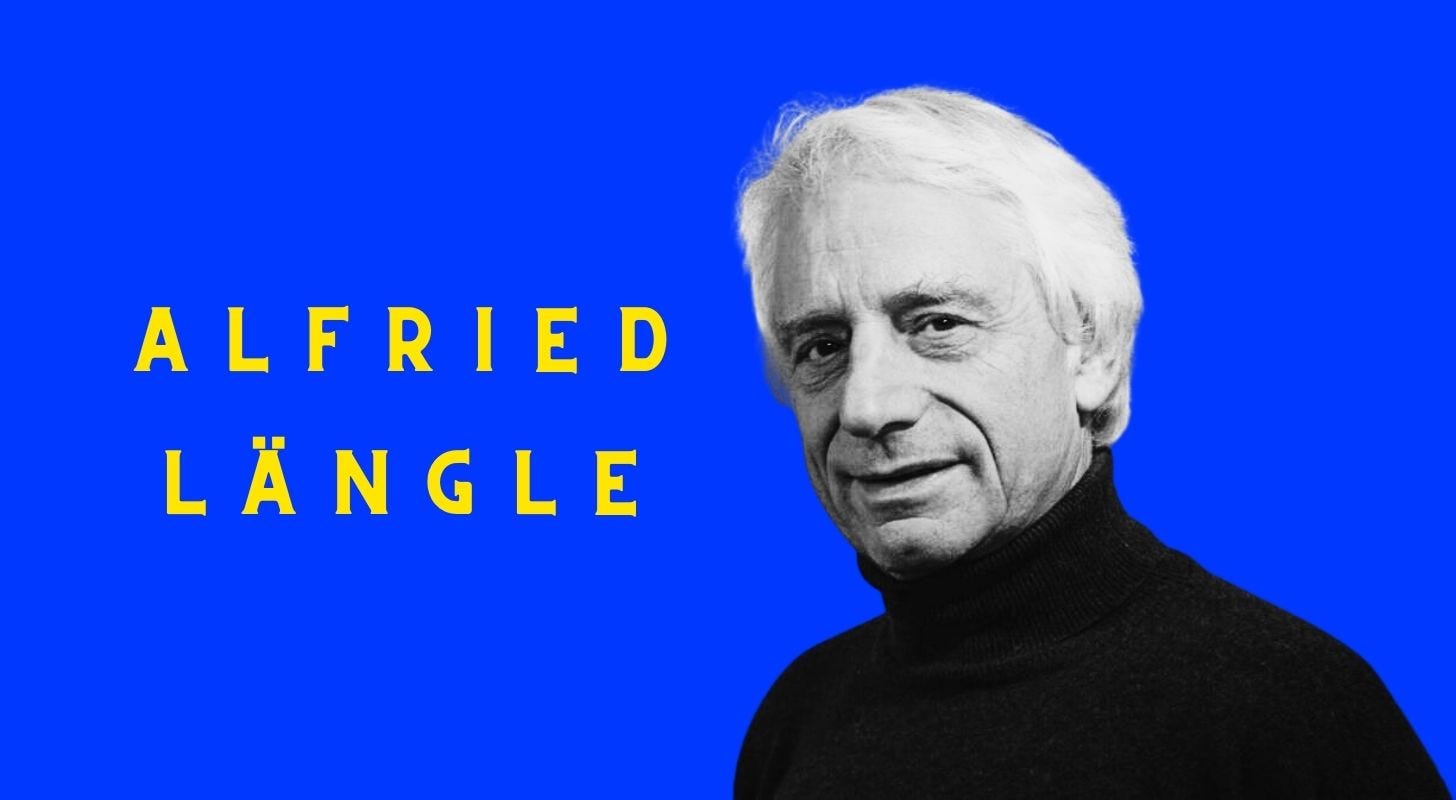We are coming out of the gate swinging, folks! This week we are publishing our very first essay by none other than the father of existential analysis: Alfried Längle.
Prof. Längle is a psychotherapist, psychiatrist, psychologist and, interestingly enough, was once a pupil of Viktor Frankl himself. He is the founder and former president of the International Society for Logotherapy and Existential Analysis and former vice president of the worldwide International Federation of Psychotherapy (the oldest such institution). His dedication to the field of psychotherapy has revolutionized what it means to be a therapist and has allowed phenomenology to move from a theoretical framework to a practical modality.
Existential Respect
The Art of Living and Relating Through Phenomenology
Alfried Längle, Vienna
We, as humans, are not determined. You and I are fundamentally free.
Our innate desire is to use that freedom to be ourselves, to do what we want, and, perhaps most fervently, to be respected in our will and seen for who we are.
Which is why we feel resistance, rebellion, or even aggression when our freedom is not respected and taken into account; when we are pressured, pushed, narrowed, dominated, manipulated, subordinated, compartmentalized, or find ourselves in relationships or places that feel prison-like.
We must remember that all beings have this same desire, encounter the same resistance, and warrant the same existential respect. One central modality of doing justice to this kind of respect (which we not only need from others but also from ourselves for ourselves) is openness—an openness in encounter. What does this mean?
When we are open we must first look at the other and ask:
“How do you appear to me today?”
“What impression do I have when I see you?”
“What feelings show up in me when I see you?”
In this attitude we look simultaneously at two groups of feelings:
Feelings that emerge as a consequence of how you (someone or something) look and appear to me today when I let my Self be touched by this impression.
Feelings that come from inside like insecurity, joy, or from my previous experiences with you or with similar persons, situations, circumstances.
We must learn to distinguish between the two groups of feelings to ensure that we’re not preventing ourselves from seeing someone as they are. I don’t want to allow the emotions that come from inside–such as anger, attraction, a painful memory–to dominate or impose on you and take away what is yours and the space you need to be who you are when with me.
When I want to encounter you, I am intentional about respecting your freedom. I do this by not imposing the feelings, ideas, explanation, and experiences that belong to me upon you. I do it by asking you what moves you. Only you can tell me what you are occupied with.
I let you be free by not placing an explanation of why you feel the way you feel (e.g. angry, because you have a terrible partner; happy because you got a promotion etc.). I refrain from any trial to categorize and attribute what moves you but let free what is really in you and remain open to that. Instead of having an explanation I let myself be touched when spoken to by you personally. Thus I get an understanding of you (or me if I am looking at me).
This process brings up the important distinction between explaining and understanding someone. Explaining makes our encounter a bit objective. It puts something between you and me and creates a distance. When my partner is angry with me, I can react with an explanation like: “Don’t project your negative feelings with your father upon me, I am not your father!” The explanation may even be true, maybe partially, but it doesn’t encounter the other person; it does not fully consider their actual pain and what they want to say out of their freedom and uniqueness in this specific situation of anger. It is a generalizing and objectifying view on the other that may lead to them feeling rejected, even offended. I am not saying that such explanations don’t have a right to be considered, but first we should establish an open space which respects their freedom.
In order to do so, I need to take a step back from all previous understandings, theories, knowledge, experiences, and bracket them for a moment and open myself by asking as described above: “What hurts you? What is your pain?” More generally speaking: “What moves you? What touches you? With which values (or loss of value) are you internally, personally, subjectively occupied?” When I can feel what you feel, when I can see the value which touches you (e.g. you are suffering because you feel abandoned and this pain makes you angry) than I understand you. You might say: “I understand now. You feel hurt because you haven’t been seen by me.” Then the other can feel seen. Because now I can feel what is important to them. Understanding brings us closer together, makes us see each other more deeply, and in our connectedness, the world.
It is purely subjective: I personally see what touches, moves, motivates, occupies you. We are not speaking about reasons or logic, we speak about your values and contents, and mine, not about formal and determining cause-effect relations. There is freedom in understanding–individually, you and I are being touched by what matters for both of us.
This appropriate attitude of openness is best described by a very scientific word which may scare you: “phenomenology”.
But don’t be scared. It just means a deeper reflection, a practice of something every human being is capable of. In phenomenology we refer to how things appear to us, how it “looks like” for us–purely subjectively. It takes courage to believe that what I personally sense is a trustworthy perception which reflects a “true reality”. The importance of this personal perception is reflected when we say: “It is the tone that makes the music.” Similarly, it is the “how” you say something that makes the difference. In this we refer to our genuine phenomenological capacity to perceive something essential which can hardly be objectified: “I sense your attitude towards me, towards the theme and this is maybe even more important than ‘what’ you said”.
We are not taught by society to pay attention to such purely subjective perceptions. But this is the attitude by which we let things be free and give them ultimate space. By looking at what “speaks to me” or even “leaps at me” we can catch what is the most important for us, subjectively, in this situation. In a phenomenological attitude we set aside all prejudices and knowledge, we refer to what we sense intuitively in this specific situation in a threefold openness:
Open towards what comes to me and touches me and what “speaks to me” from the outside, from you (What do I sense inwardly while I am listening and looking to you?)
Open towards my inward impression and what it evokes in me (How does what you tell me do with me inwardly?)
Open towards what could come to you and how it will turn out in the future (What will move me and you tomorrow? How is it going to change?)
It is through such an openness that we can grasp that what is essential in the situation—and eventually in life.
For more information about Prof. Längle’s work, see the video below:






